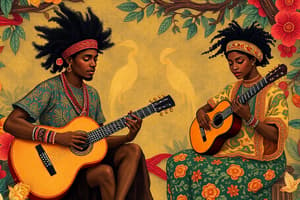Podcast
Questions and Answers
What is the significance of music in African culture?
What is the significance of music in African culture?
- To communicate, to entertain, and to accompany worship activity (correct)
- To teach language, to preserve ancient artifacts, and to govern political activities
- To trade goods, to cultivate crops, and to conduct scientific experiments
- To sell products, to celebrate sports events, and to perform magic
Which of the following is a major characteristic of African melodies?
Which of the following is a major characteristic of African melodies?
- Use of electronic instruments for melody creation
- Use of complex harmonies and counterpoint
- Use of ostinato, a repeated pattern (correct)
- Use of random, unpredictable melodic patterns
What role does harmony play in African music?
What role does harmony play in African music?
- Harmony plays a minor role in African music (correct)
- Harmony is the central focus of African music
- Harmony is only used in specific ceremonial music
- Harmony is completely absent in African music
Which activities are accompanied by music in African culture?
Which activities are accompanied by music in African culture?
What is a unique characteristic of African singing?
What is a unique characteristic of African singing?
Which section of African musical instruments is considered the most important?
Which section of African musical instruments is considered the most important?
What are professional musicians called in Africa?
What are professional musicians called in Africa?
Which type of drum is believed to contain spirits that guide the player?
Which type of drum is believed to contain spirits that guide the player?
Which vocal form evolved from the African Americans during the latter part of the nineteenth century?
Which vocal form evolved from the African Americans during the latter part of the nineteenth century?
What is soul music characterized by?
What is soul music characterized by?
What defines Ballad music?
What defines Ballad music?
Which genre is Jazz predominantly created by?
Which genre is Jazz predominantly created by?
What is the defining characteristic of Rock and Roll music?
What is the defining characteristic of Rock and Roll music?
What defines Rhythm and Blues (RnB) music?
What defines Rhythm and Blues (RnB) music?
What does Rap music involve?
What does Rap music involve?
Flashcards are hidden until you start studying
Study Notes
The Significance of Music in African Culture
- Music plays a vital role in African culture, serving various purposes beyond entertainment.
- It is deeply intertwined with daily life, ceremonies, rituals, and social interactions.
- It serves as a form of communication, storytelling, and expression of emotions.
Characteristics of African Melodies
- African melodies frequently employ complex rhythms and intricate patterns.
- They often feature scales and intervals different from Western music.
- A distinctive characteristic is the use of call and response patterns.
Harmony in African Music
- Harmony, as understood in Western music, may not always be a dominant feature in African music;
- However, different forms of polyphony, where multiple voices or instruments play simultaneously, are common.
- These polyphonic textures may involve interlocking rhythms or weaving melodies together creating rich textural interplay.
Musical Accompaniment in African Culture
- Music is integral to various activities in African culture, including:
- Religious ceremonies, festivals, celebrations
- Work, hunting, farming tasks
- Storytelling and social gatherings
Characteristics of African Singing
- A defining feature of African singing is the use of extended vocal techniques, such as:
- Yodelling
- Falsetto
- Glissando
- Vibrato
- These techniques create distinctive textures and expressive qualities.
Importance of Percussion Instruments
- Percussion instruments hold significant importance across various African cultures.
- They are often considered the heart and soul of African music.
Professional Musicians in Africa
- In many African cultures, professional musicians are held in high esteem and play a vital role in society.
- Traditional names for professional musicians vary depending on the region.
- They may be known as "griots" or "praise singers" in some cultures.
Significance of the Drum
- Drums are particularly revered in African cultures.
- Some drums are believed to embody spirits that guide the player and influence the music.
- These drums are often used in spiritual ceremonies and rituals.
Evolution of Soul Music
- Soul music is a genre that developed in the United States during the latter part of the nineteenth century.
- It has roots in African American gospel, blues, and rhythm and blues music.
Characteristics of Soul Music
- Soul music is characterized by its emotional intensity and soulful vocals.
- It typically features strong vocals, prominent rhythm sections, and impassioned lyrics.
Defining Ballad Music
- Ballad music primarily focuses on storytelling through lyrical narratives.
- It encompasses a wide range of emotions, from joy and love to sorrow and tragedy.
Origin of Jazz Music
- Jazz is a genre predominantly created by African American musicians in the early 20th century.
- It evolved from blues and ragtime music and is characterized by improvisation and syncopation.
Defining Rock and Roll Music
- Rock and roll music is characterized by its energetic rhythm, strong backbeats, and amplified sound.
- It emerged in the 1950s and incorporated influences from blues, country, and gospel music.
Rhythm and Blues Music
- Rhythm and Blues (RnB) music is a blended genre influenced by blues, gospel, jazz, and soul music.
- It features a strong emphasis on rhythm, soulful vocals, and lyrics often focusing on love, relationships, and everyday life.
- It became popular in the 1940s and continues to evolve and influence contemporary music.
Rap Music
- Rap music is a genre that emerged in the Bronx borough of New York City in the 1970s.
- It typically consists of rhythmic and rhyming speech, delivered over a musical beat.
- Rap music encompasses various subgenres, including East Coast rap, West Coast rap, and gangsta rap.
Studying That Suits You
Use AI to generate personalized quizzes and flashcards to suit your learning preferences.



